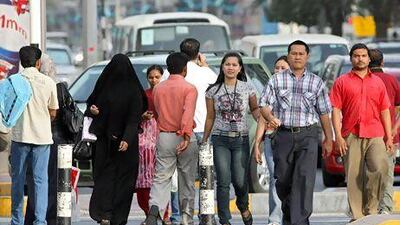A wave of public-sector hiring and immigration across the Arabian Gulf means average economic output per person is expected to slow by nearly half, Standard & Poor's said yesterday.
Average per capita growth will slide from 1.4 per cent over 2011 and last year to 0.8 per cent this year and next, the ratings agency said.
"This is partly due to national population growth as well as the ongoing immigration of foreign labour," analysts wrote in S&P's GCC Report Card. "The latter is also implicitly a reflection that locals tend to work in the less productive public sector. We see few signs of change to this, despite reform plans."
A stabilising in oil output and government spending this year from recent increases since the Arab Spring also played a role in the slowdown, said Dima Jardaneh, S&P's credit analyst, and one of the reports' authors.
Most GCC states raised output in 2011 and last year to compensate for cuts to Libyan output in 2011 and more recently for the dip in Iran's exports as a result of international sanctions.
The UAE, Saudi Arabia, Qatar and Oman also raised wages for some government workers following the regional unrest.
Still, S&P said the region's sovereign ratings remained stable, supported by high energy reserves, and insulated from regional and global uncertainties.
It forecast GDP to have reached 5.2 per cent last year, before slipping marginally to 4.6 per cent this year. But the agency warned structural challenges continued to constrain sovereign ratings.
"There are still particular shortcomings in the effectiveness and predictability of policymaking in the GCC," said Ms Jardaneh. "Weaknesses include the quality of policy debate; the strength and depth of institutions; transparency of decision-making; data monitoring and reliability of information; legal frameworks and the rule of law; and succession risks."
Despite turmoil in the wider Arab world and protests in some GCC states, no governments had yet undertaken major reforms in the past two years.
A lack of monetary policy flexibility was another restriction on ratings for the GCC, it said. Five of the six GCC states operate pegs to the United States dollar, meaning their monetary policy is largely dictated by steps taken by the US Federal Reserve.
The inability to pursue independent monetary policy meant authorities had fewer tools to handle economic imbalances and shocks.
As an example, inflationary pressures had become difficult to contain since 2005, S&P said, as higher oil revenues for the GCC deepened the region's lack of alignment with America's business cycle. Inflation in the region had begun to flare up again in some parts after reaching double-digit highs in 2008. Inflation in Saudi Arabia reached 4.5 per cent last year, the highest in the GCC.
The report also highlighted the likelihood of oil reserves petering out in some GCC countries much earlier than in others.
"The oil endowment varies significantly across the GCC," said Ms Jardaneh. "Reserves at the current production levels will last about 90 years in Abu Dhabi and Kuwait and 70 years in Saudi Arabia, but are considerably lower in Oman and Bahrain where, at current production levels, supplies could run out in the next two decades."

